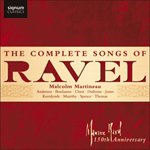After the War, Ravel’s output slowed markedly and only eight songs date from 1917 to his death twenty years later. It was the time of ‘dépouillement’, of stripping away lavish pre-War costumes to reveal the musculature beneath. As an example of this it would be hard to improve on the song
Ronsard à son âme which was Ravel’s contribution, together with those of eight other composers, to a special number of the
Revue musicale to celebrate the 400th anniversary of the poet’s birth in 1924. Under three minutes in length, it is the simplest song he ever wrote. The piano part consists mostly of bare fifths for the right hand alone, and Ravel declared it was his favourite among his own songs because he could play and hold a cigarette at the same time. Ronsard’s desire to infuse the French language with the spirit of the classics is matched in Ravel’s setting, also retrospective in its almost Palestrinian regulation of consonance and dissonance. At the same time the piled-up fifths of the final chord would seem to have been borrowed from the last song of Milhaud’s cycle
Catalogue de fleurs, premiered as recently as 1922. Ravel touched on his song’s valedictory quality in a letter to Falla: ‘I’ve written my Epitaphe, or at least Ronsard’s, and I’ve put as much zest into it as if it was destined for me.’
from notes by Roger Nichols © 2009
Après la guerre, la production de Ravel s’est nettement ralentie et il a composé seulement huit mélodies entre 1917 et sa mort, vingt ans plus tard. C’est l’époque du «dépouillement», on retire les somptueux costumes d’avant-guerre pour révéler la musculature qui est au-dessous. En guise d’illustration, il serait difficile d’aller plus loin que la mélodie
Ronsard à son âme, qui fut la contribution de Ravel, avec celles de huit autres compositeurs, à un numéro spécial de la
Revue musicale pour le quatre-centième anniversaire de la naissance du poète en 1924. Durant moins de trois minutes, c’est la mélodie la plus simple qu’il ait jamais écrite. La partie de piano se compose essentiellement de quintes à vide pour la main droite seule, et Ravel a déclaré que c’était sa préférée parmi ses propres mélodies parce qu’il pouvait jouer et tenir une cigarette en même temps. Le désir de Ronsard d’insuffler à la langue française l’esprit des classiques trouve un écho dans la musique de Ravel, tout aussi rétrospective dans sa façon presque palestrinienne d’arbitrer entre consonance et dissonance. En même temps, les quintes entassées de l’accord final semblent avoir été empruntées à la dernière mélodie du cycle de Milhaud,
Catalogue de fleurs, créé peu auparavant, en 1922. Ravel a abordé la question de l’adieu dans un lettre à Falla: «J’ai écrit mon Epitaphe, ou du moins celle de Ronsard, et j’y ai mis autant d’entrain que si elle m’était destinée.»
extrait des notes rédigées par Roger Nichols © 2009
Français: Marie-Stella Pâris
Nach dem Krieg ließ Ravels Schaffen deutlich nach und nur acht Lieder entstanden zwischen 1917 und seinem Tod zwanzig Jahre später. Es war dies das Zeitalter des „dépouillement“, die verschwenderischen Vorkriegskostüme wurden beiseite gelegt, um sozusagen die darunterliegende Muskulatur sichtbar werden zu lassen. Es gibt kaum ein besseres Beispiel dafür als
Ronsard à son âme, Ravels Beitrag zu einer Spezialausgabe der
Revue musicale anlässlich des 400. Geburtstags des Dichters im Jahre 1924, zu der außer Ravel noch acht weitere Komponisten beitrugen. Das Stück hat eine Dauer von weniger als drei Minuten und ist das schlichteste Lied, das er je komponiert hat. Der Klavierpart besteht zum größten Teil aus leeren Quinten für die rechte Hand und Ravel erklärte es zu seinem eigenen Favoriten, weil er es spielen und gleichzeitig eine Zigarette halten konnte. Ronsards Wunsch, der französischen Sprache den Geist der Klassiker einzuflößen, kommt auch in Ravels Vertonung zum Ausdruck, die eine fast Palestrina-artige Regulierung von Konsonanzen und Dissonanzen an den Tag legt. Gleichzeitig scheint die Quintaufhäufung beim Schlussakkord eine Anleihe von Milhauds Zyklus
Catalogue de fleurs zu sein, der erst 1922 uraufgeführt wurde. Ravel äußerte sich über die Abschiedsstimmung in seinem Lied in einem Brief an Falla: „Ich habe mein Epitaph geschrieben, oder jedenfalls Ronsards, und ich habe es mit ebensoviel Würze versehen, als wäre es für mich selbst gedacht.“
aus dem Begleittext von Roger Nichols © 2009
Deutsch: Viola Scheffel


 Ravel: The Complete Songs
Ravel: The Complete Songs
